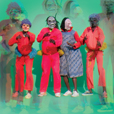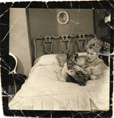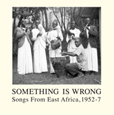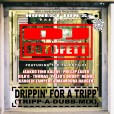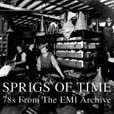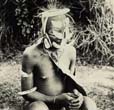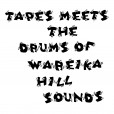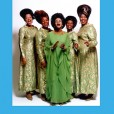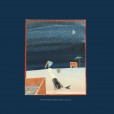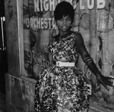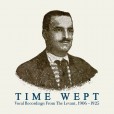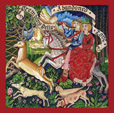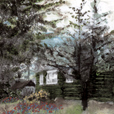Your basket is empty

An astounding compilation of the breakneck Shangaan dance output of the Nozinja studio in Soweto, recorded between 2006 and 2009.
Soulful American folk: a gorgeous, heart-stopping mixture of the longing you get in saudade — singers like Cesaria Evora and Joao Gilberto — and political protest. Will Oldham’s in there; so is Dionne Warwick.
‘An album of cathartic intimacy, built around electronic textures and sparse percussion, with White’s gently yielding, half-spoken vocals pitched pleasingly between Laurie Anderson and Joni Mitchell’ (Mojo).
Back with a pared-down, western sound. Bitter-sweet and nostalgic, but cut with longing, fantasy and hopefulness, in a daze (sometimes child-like) over lost love, lost innocence, lost years. ‘****’ (Mojo).
Thirty-five stingers from an HMV run of more than four hundred 78s, recordings made in Uganda and Kenya from the mid-1930s till the mid-1950s.
The second half of the CD.
Epic, protean brilliance from the Sotofett corner, bumping nylon New Age and ill Chill Out up against reggaeton and jungle exotica, spilling batucada-style percussion workouts out of clean-heeled house.
Each side spins the wheel and introduces a new collaborator or two — Phillip Lauer from Tuff City Kids is here; Gilb’r from Versatile (on a new version of Pulehouse)...
The knockout punch is there on side three: Nondo — which means ‘Heaven’, ‘Eternity’ — starts out as an electro-lullaby from Côte d’Ivoire, sotto voce and abuzz, before lifting off as a zinging, anthemic, future-house-classic.
A real tour de force all round, gusting in from Moss.
Three murderous steppers dubs on a propulsive, rat-tat-tat rhythm, combining mystical spaciousness with detail and ferocity. Angry-lion bass and smears of brass, fusillades and explosions, scares and shocks, oriental pentatonics, clattering percussion and synthy transcendence… the business. The second mix is nastiest; the third is the wildest and most discombobulated (and our favourite).
Bim bim bim.
‘A wicked sense of pacing, of beauty and absurdity, and an instinctive ear for musical action’ (The New York Times). ‘There’s no theme or continuity… unless you count sheer awesomeness’ (Fader).
‘Three years ago Honest Jon’s put out her late ‘60s and early 70s recordings and it’s the most unimpeachable collection of heartbreak you’ll ever hear. This new album is just as good’, NME
‘Early contender for 2009’s album of the year. Yes, already’ (Mojo). ‘The sheer soul in her voice is revolutionary’ (NME).**** The Independent, The Times. ‘**** a masterclass in gritty southern soul’ (Daily Mail).
Torsten Profrock’s occult homage to UK garage.
Two-step waylaid in the scuffed, churning, sub-heavy terrain running from his Chain Reaction days to Monolake, mysteriously entangled with the distressed tracks of old Ugandan 78s.
This started out a couple of years ago as a grounation drumming session above the old headquarters of the Mystic Revelation Of Rastafari, in Wareika Hill, Kingston, JA. Four funde, a repeta and a bass drum. Back in London, contributing flute and guitar, Kenrick Diggory unbottled the deep rootical psychedelia and sheer awe of Hunting — the Keith-Hudson-versus-Count-Ossie wonder of the world — and Tapes added electronics, a shot of Drum Song… and a giddily intense binghi dub.
‘Terry Hall has returned with his best work in decades… a daring, thoughtful set’ (The Guardian); ‘***** the real message lies in the boldness of its musical vision… world music album of the year’ (The Times).
‘Recorded as Blair and Bush were conspiring to strike fear and loathing into the region responsible for these grooves, it’s every bit as topical as Ghost Town, as eerie as War Crimes’ (Time Out).
Nominally this is a collaboration between Terry Hall and Mushtaq, once of British-Asian pioneers Fun-Da-Mental — but ‘everybody we worked with had a story to tell,’ recalls Terry Hall, ‘and their stories became part of the record. We were blessed with the range of people we found.’ A Tunisian singer, a Syrian flautist, an Egyptian who had settled in Iraq, a twelve-year old Lebanese girl, a blind Algerian rapper from Paris, a choir of Polish gypsy refugees brought in from a social club in Leytonstone, the clarinettist who recorded the original Pink Panther theme; singers in Hebrew, English, Arabic, Romany. ‘Everybody had a sense of something in common in their minority and oppression and struggle. In the end, it felt more like we were editing a film than making a record.’
A year in development, the album is also a powerful reflection of the time in which it was made and the storm that was gathering: Bush and Blair were intent on Armageddon in Iraq; in the refugee camps on the West Bank, atrocities were being committed on a daily basis; closer to home, sections of the British media used the fear of terrorism to whip up a hate-fuelled campaign against asylum seekers and other minorities pushed to the margins of society.
‘What was going on as we were making the record seemed to make it more and more political. We had something to say, but we wanted to avoid being worthy or preaching and keep the words to a minimum.’
Magnificent Wolof drum music, performed by an extended griot family in the mystical setting of Lac Rose, outside Dakar.
Doudou Ndiaye Rose — who died in 2015 — is a key drummer in the musical history of the world. He developed a system of five hundred original drumming patterns, ancient and new. Amongst the modern rhythms here is Bench Mi — ‘under the Baobab tree,’ a spot where where problems get solved. Also Hibar Yi — ‘passing on information’ — the theme-tune of Senegalese TV national news for decades — and Les Rosettes, the signature rhythm of Senegal’s first ever all-female percussion group, convened by Doudou, and named after his grandmother.
These original compositions sit alongside important traditional rhythms, familiar to every Sabar player, such as Farwu Jar ( a courtship game sometimes resulting in a wedding), Ceebu Jin (also the name of the national dish of fish and rice), and Gumbé, often played after a successful harvest.
Recorded in joyful single takes, over seven consecutive days in February 2020, with no overdubs, mastered by Rashad Becker, the music is deep and thrilling, polyrhythmic to the bone, with a complex, pointillistic intensity at times evoking Jeff Mills in full flight.
A scorcher from the golden age of gospel, via its cardinal label.
From 1960, during the family’s second decade with Savoy, featuring Gertrude Ward, Christine Jackson, Mildred Means and Vermettya Royster — and Clara, totally riveting and in-your-face with evangelistic fervour and raw soul.
Plus a rambunctious, floor-filling Wade In The Water, by Jessy Dixon and his Singers.
Handsomely sleeved (showing a contemporary but slightly different Wards lineup).
Dedicated ‘to the United Nations and especially young people’, this is slow-burning, steeply screwed, early-seventies Atlanta funk by James Conley and co, spun out of a line from Eliza Hewett’s nineteenth-century hymn, When We All Get To Heaven.
The flip is deadly, too: a super-soulful blend of Sly & The Family Stone with Kool & The Gang, movingly confused and sincere in its pleading (without threats or machismo) to be loved back.
Both sides come with instrumentals. Check part two of Get Together.
Beautifully sleeved.
Though music journalists made a big deal recently about the release of a 1965 rehearsal tape by Derek Bailey’s Joseph Holbrooke trio with Gavin Bryars and Tony Oxley, those early efforts were mere tentative steps along a cliff edge wearing a line safely attached to Coltrane. There’s still a whiff of jazz to Bailey and Parker’s work with the Spontaneous Music Ensemble up to and including 1968’s Karyobin.
But with the addition of Jamie Muir — the first great free improvising percussionist who didn’t start out as a jazz drummer — and the way-leftfield electronics of Hugh Davies, the MIC leapt right off that cliff.
These six tracks — tight, electric, pointillistic, brilliant, uncompromising and exhilarating — sound like nothing else that came before.
In a word, seminal.
A dazzling survey of the last, bohemian flowering of the so-called Golden Era of Ecuadorian musica national, before the oil boom and incoming musical styles — especially cumbia — swept away its achingly beautiful, phantasmagorical, utopian juggling of indigenous and mestizo traditions.
Forms like the tonada, albazo, danzante, yaravi, carnaval, and sanjuanito; the yumbo, with roots in pre-Incan ritual, and the pasillo, a take on the Viennese waltz, arriving through the Caribbean via Portugal and Spain.
Exhumations like the astoundingly out-there organist Lucho Munoz, from Panama, toying with the expressive and technical limits of his instrument; and our curtain-raiser Biluka, who travelled to Quito from Rio, naming his new band Los Canibales in honour of the late-twenties Cannibalist movement back home, dedicated to cannibalising other cultures in the fight against post-colonial, Eurocentric hegemony. He played the ficus leaf, hands-free, laying it on his tongue. One leaf was playable for ten hours. He spent long periods living on the street, in rags, when he wasn’t in the CAIFE studio recording his chamber jazz-from-space, with the swing, elegance and detail of Ellington’s small groups, crossed with the brassy energy of ska — try Cashari Shunguito — and an enthralling other-worldliness.
Utterly scintillating guitar-playing, prowling double bass, piercing dulzaina, wailing organ, rollicking gypsy violin, brass, accordion, harps, and flutes. Bangers to get drunk and dance to. Slow songs galore to drown your sorrows in, with wildly sentimental lyrics drawn from the Generacion Decapitada group of poets (who all killed themselves); expert heart-breakers, with the raw passion of the best rembetica, but reined in, like the best fado.
Fabulous music, like nothing else, exquisitely suffused with sadness and soul. Hotly recommended.
Sumptuously presented, in a gatefold sleeve and printed inners, with a full-size, full-colour booklet, with wonderful photos and excellent notes. Limpid sound, too, courtesy of original reels in Quito, and Abbey Road in London; pressed at Pallas.
Fired-up, originary African pop, conjuring the Congolese rumba from imported Latin 78s — with thumb pianos, kazoos, banjos, bottles, violins, and irresistible little songs about pimps, dope, clubbing, sex, death.
Stunningly beautiful, poignant music from Bilād al-Shām — ‘the countries of Damascus’, known nowadays as Syria, Lebanon and Palestine — including performances from the very first recording sessions in the region.
The legendary, moody Beirut singer Būlus Ṣulbān is here — some historians have him singing before Egypt’s Pasha Ibrāhīm Bāshā during his military campaign in Syria, in 1841 — and Ḥasība Moshēh, Jewish ‘nightingale of the Damascene gardens’. Thurayyā Qaddūra from Jerusalem; Yūsuf Tāj, a folk singer from Mount-Lebanon; Farjallāh Baiḍā, cousin to the founders of Baidaphon Records… Musical directors like the lutist Qāsim Abū Jamīl al-Durzī and the violinist Anṭūn al-Shawwā (followed by his son Sāmī); such virtuosi as the qanun-players Nakhleh Ilyās al-Maṭarjī and Ya‘qūb Ghazāla, and lutist Salīm ‘Awaḍ.
Even at the time, notwithstanding such brilliance, public music-making was frowned upon as morally demeaning, especially for women. Musical venues were generally dodgy. Ṣulbān once cut short a wedding performance for the Beiruti posh, after just one song, he was so disgusted with his audience.
‘If I had to tell you about the catcalls,’ one commentator wrote about the musical theatre of the time, ‘the stomping of feet, the sound of sticks hitting the ground, the noise of the water-pipes, the teeth cracking watermelon seeds and pistachio nuts, the screams of the waiters, and the clinking of arak glasses on the tables, I would need to go on and on and on…’
Tipped by the New York Times: ‘I have heard no more beautiful record this year… a righteous calm takes over the album like a spirit force.’
‘brilliant… concise, deeply romantic, totally original ****’ (Mojo); ‘freewheeling and delightfully quirky ****’ (The Guardian); ‘CD Of The Week… terrific’ (The Observer); ‘like nobody ****’ (Sunday Times).
‘Jesus fucking shit! These jamz claw so hard at the tatties below methinks the Lord misnamed them, having intended to say trembling BALLS’ (Will Oldham). ‘My kind of band… Highly recommended’ (Joe Boyd).
